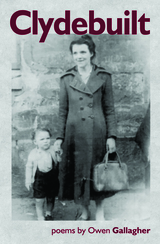Clydebuilt
Owen Gallagher
Price: £7.99

‘Ah’ll show yoo anuther Glesca,’ announces Owen Gallagher in ‘Thi Unoffishal Toorist Guide Oootside Glesca Central’, not the ‘bleached version’ of history books and tourist brochures. Clydebuilt is a book about growing up in the Gorbals in the 1950s and 1960s – poverty, pawnshops and sectarianism, carbolic soap and lice, Saturday morning at the pictures, violent teachers, razor-gangs and blacklists. It’s a book about words – Glaswegian dialect, Latin and the Church’s ‘tabernacle of language’. And it’s a book about Red Clydeside, a city of dreamers, fighters, singers and rebels.
Ah’ll show yoo anuther Glesca, wan wi heid bangers sportin chibs tae stick in ribs an folk who hiv woke tae find thair milk n meter munny nicked. Ir greetid everi Friday wi a q it thi door: loan sharks, rent arrears men, priests an spivs. Where stray gulls n cats ir scoffd like Mars Bars n weans scalps hiv bin mauled by nits. Don’t bi connd bi cafs n galleries there’s sods here who wipe thair gobs wi fivers n widnae think twice o payin someone’s ma wi lefters an claes unfit fir charity. Folk here hiv nae mair holes in thair belts tae tighten tae fit sum right hoorable’s stratigy. Firget thi toorist hype, ‘Glesca’s great!’ Ah’ll tell yoo aboot thi Clydeside thit made thi English Government pipe thit thi Revolooshun wid start here n planked tanks n gangs o strike breakers. Dae yi want a bleached version o Glesca? Wan thit’s bin writtin oot o thi history books? Ah’ve git three weans tae feed. Ah’ll dae it fir a cuple a quid!’
In the tenements there were workers who built dreams for others, singers who got drunk on rebel songs, fighters who fought for themselves in the workplace and lost every round all in revolt against an assembly line of masters. I saw a new world being assembled in a sweatshop where dreamers, singers, fighters, unfurled a trade union flag, their voices bolted and welded into one.
Ah strode intae an early wurld stalked by a giant an witnessed a man dreep doon a drainpipe, pub doors openin tae knocks like thi Morse Code, an a queue already formed ootside the pawn shop; Father Chalmers sprintid wi rosary beads in haun, Uncle Hugh bolted frae a tenement, shirt-tail flappin, my father stood on a street corner hopin tae be chosen fir wurk. The giant boy trailed me intae a close tae theive ma paper-round, snatched ma satchel an ma list, placed a finger oan his lips then droo it across his throat. Ah walked aff like that yung fella in the Bible, intae the Valley of Elah, plucked a marble frae ma pockit, turned an raised ma sling.
Afore Sunday mass ma da wid balance mi oan his knee, trawl ma scalp wi’ a metal comb tae see if lice hid dared tae land, sabre thaim wi’ a thumbnail, an’ flush thi corpses doon thi sink. (At times hail continents o’ lice wur on thi move, driftin’ snowfields that turned intae an avalanche when ah sneezed. Ah watched is thay landed ontae ma mates heids – their ma’s demanded ma exclusion frae skool). When ma scalp wis free frae these bloodsuckers ma da wid massage Fairy Soap thro ma hair, lea it tae set in wave efter wave: a frozen ocean nae heid lice cood scale; a rock face nae fitba cood dent.
Ah wis reared in a toon whaur alsations guarded milkmen, gas meters wur robbed mid-week ’n’ conductors rarely asked fur fares oan thi lest bus hame. Where it paid tae bi alert iz a commando parachuting intae enemy territory, and wiz safer tae lea thro back courts, scale walls lik’ spiderman, an’ skite doon telegraph poles intae alleyways than bi challenged bi youths oan thi street in a scene thit cood’ve bin shot in ‘High Noon’ whaur thae droo nae guns but razors and snarled; ‘Celtic or Rangers’? which prompted a startin’ pistol tae gae aff in ma heid. There wis nae careers advice tae show how thi future micht blow. Tae escape ye hud tae outwit yer opponents oan thi field wi’ a baw, or don a dog-collar.
‘His poems are determinedly unpretentious, favouring brevity and humour. They inhabit the gentler side of satire, attacking taboos, but without making the reader feel under attack, nipping the edges of middle-class comfort-zones without introducing an icy draught.’
Carol Rumens
‘Gallagher has a genius for the short poem. He is witty, funny, surprising radical without being ideological and very, very dexterous in his use of language.’
Mistress Quickly’s Bed
‘A tight focused collection. Gallagher celebrates the dignity and resilience of the working class.’
Iota
‘Gallagher is a trouble-making poet, stirring things up. He’ll keep you asking yourself which side you’re on.’
Michael Rosen
‘His work is remarkably free of that straining to be poetic which is the mark of the writer who wants to be a writer. It has that feel of inevitability of honest art.’
Mistress Quickly’s Bed
‘Buy this, read it and learn something we’re in danger of forgetting to our cost.’
Martin Malone, Poetry Wales